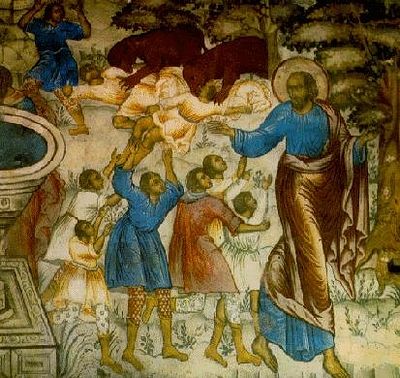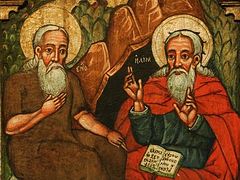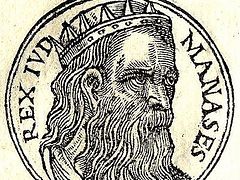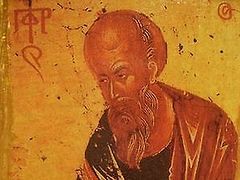And he went up thence to Baethel: and as he was going up by the way there came up also little children from the city, and mocked him, and said to him, Go up, bald-head, go up. And he turned after them, and saw them, and cursed them in the name of the Lord. And, behold, there came out two bears1 out of the wood, and they tore forty and two children of them (4 Kings 2:23-24).
This passage in the Old Testament from the life of the prophet Elisha is quite shocking. It has often been cited by atheists as proof of a cruel God. But we know of course that there is much more to the Old Testament than that, and so on this feast day of the prophet Elisha we would like to explore this passage through two explanations: one of a contemporary Russian Orthodox priest, and the other by St. Ephraim the Syrian.
One Priest’s commentary:
Many people simply can’t get their heads around what happened with Prophet Elisha and the children. The bears tore the children for what would seem to be total baloney: So they call him “bald-head”, so what? But the prophet was not a sorcerer; that is, God sent the bears and not Elisha through some sort of spell. What is the meaning of this? In order to have the proper understanding of this story we have to look at its broader context. This took place in Jericho, where Elisha’s independent [of Elias] prophetic service began. First the inhabitants of the city offer Elisha to send fifty people to search for the ascended Elias. Elisha says that this would be senseless, but the townspeople do not believe him. Finally, the prophet was so beleaguered by them (the Septuagint says that “they pressed him until he was ashamed) that he agreed.
In this situation we can see the Jerichoans’ profound disbelief in Elisha. By that moment the city of Jericho had existed for over seven thousand years, and its inhabitants had seen lots of things; they didn’t believe in Elisha’s prophetic calling and considered him no more that a disciple of Elias who simply wanted to “show off” while his teacher was away. Perhaps they didn’t believe him at all… Regardless of all this, the prophet worked a very important miracle in Jericho by giving them a spring of good water. But neither did this make the citizens believe him, nor did they show him any gratitude. The children’s’ contemptuous mockery testifies to the fact that the general opinion in the city had not changed.
Used to heroes, the city did not honor Elisha with any sort of gratitude. If even a word had been uttered on the square in honor of the prophet, the street children would have been there without fail… Whatever the case, it occurred to no one to defend the scorned prophet. In this context the children were expressing the disbelief and ingratitude of the entire city, and the curse of the prophet is directed not so much at the children as at the city as a whole. It must be said that ingratitude is in general very destructive. In essence, the curse only states this fact: An ungrateful city is separated from God by a deep abyss… It would not be superflous to add that all of this happened in deep antiquity; we can’t expect the prophet to “turn the other cheek”, as the Lord says in the New Testament. First of all, Elisha knows the cost of unbelief and ingratitude, and secondly, he is a man of his times. In accordance with the Old Testament norms, he curses them. Further on it turns out that his word, just like anyone’s word, had real power in the world. The city’s separation from God, the statement and confirmation of the prophet’s curse find concrete expression in the fact that the blind power of nature (in this case, the she-bears) crashes down upon the citizens.
There is decisively no basis for thinking that “God sent” these bears as if He was sitting in the clouds, minding His own business, when suddenly He heard the prophet Elisha’s curse and decided to “sic the she-bears on them.” That would be a ridiculous scene… But in this story there was no one who could call to God for help in this situation. The hearts of the citizens were far from God—this is obvious from how they related to the prophet and his miracle. But the prophet himself, an Old Testament man, acted according the measures of the Old Testament, and not the New Testment.
From an Orthodox forum on Azbuka.ru.
St. Ephraim the Syrian
It seems that the childrens’ impiety was the result of their parents’ suggestion, because they were unfair and aggressive with regard to Elias and his disciples. And we can think that they were sent by their instructors to repeat what they had learned. Truly, the words that were pronounced by Elias’s disciples, who were their co-citizens in accordance with their teacher’s teaching with regard to their teacher’s ascension, were very grievous to the inhabitants of Baethel. I would suppose that this is why those children not only mentioned his baldness but uttered other insults as well, just to bring down his glory. This was done in order so that no one would believe his words if he should begin repeating everything he had said in Baethel, and what he had tried to convince people of in Jericho. And thus, having such unworthy thoughts, they said, “This is the reason for his coming.” Then Elisha, although grieved by the children’s insolence, was many more times angered when he saw the cunning and injustice of their parents. He corrected both the former and the latter by a severe and terrible sentence: He punished the first so that they would not multiply this lawlessness as adults; and the latter so that they would be corrected and depart from their corruption. The one who blessed the children of Jericho and helped them in every way for their faith—because having seen how the Jordan had parted this way and that at his word, they said that the spirit of Elias had come to rest upon Elisha—pronounced this cruel sentence upon the inhabitants of Baethel. Of course, the inhabitants of Baethel did not believe the children of the prophets who had come to their city when they told them the news of Elias’s ascension.
And, behold, there came out two bears out of the wood, and they tore forty and two children of them. On the day that the Lord had sent Elias to anoint Elisha, He said that He would have vengeance with his help upon the children of Israel who had risen up against Him; that is, against those who had escaped the sword of Azail and Ju. Elisha became the cause of their destruction. And this is the beginning of this punishment—the word pronounced against the lawless had begun to be fulfilled.
From: Commentary on the Fourth Book of Kings
Translated from Optina.ru





So, before the world was, Jericho is...!??
Maybe you can save us this silliness. In the Scripture there is a very clear chronology, accurate enough to approximate the age of the world around 7.500 years.
If you don't believe in the Scripture, why are you speaking about it?
It's also annoying the usual concerns about the sensibilities of the enemies of God, and their tail of poor humans weeping for the poor, oh sooo poor, children. You can't have your cake and eat it too! A good God destroys evil. That's it! They cry because they love evil and idols, then they protest being paid the salary of their sin.